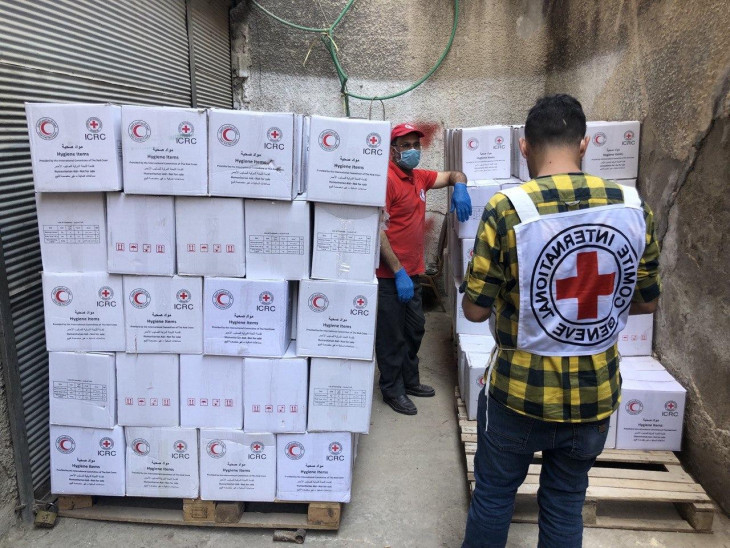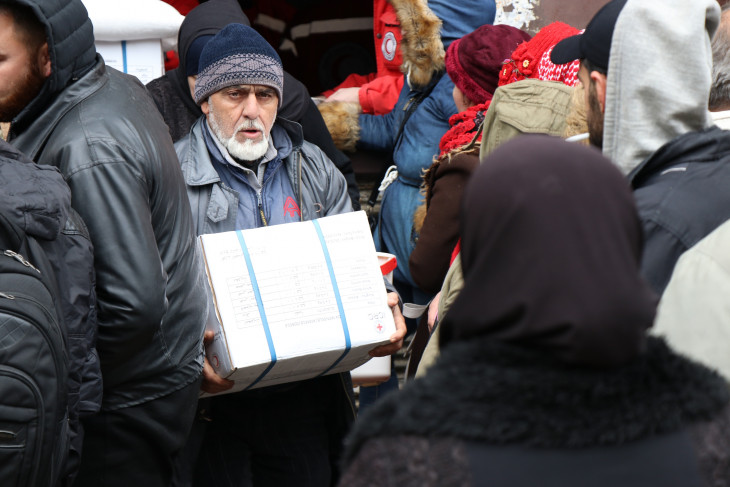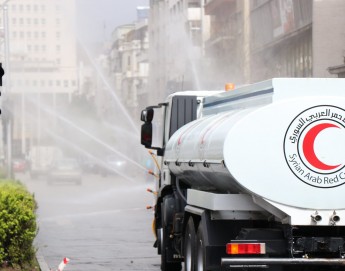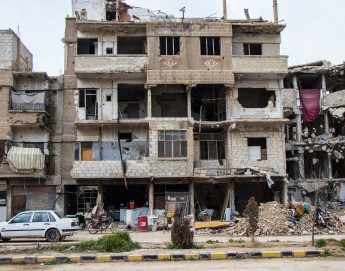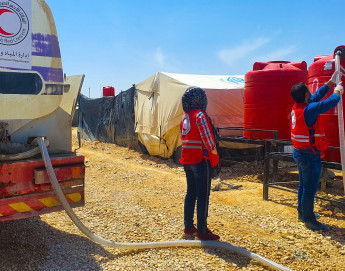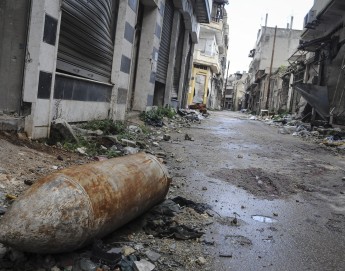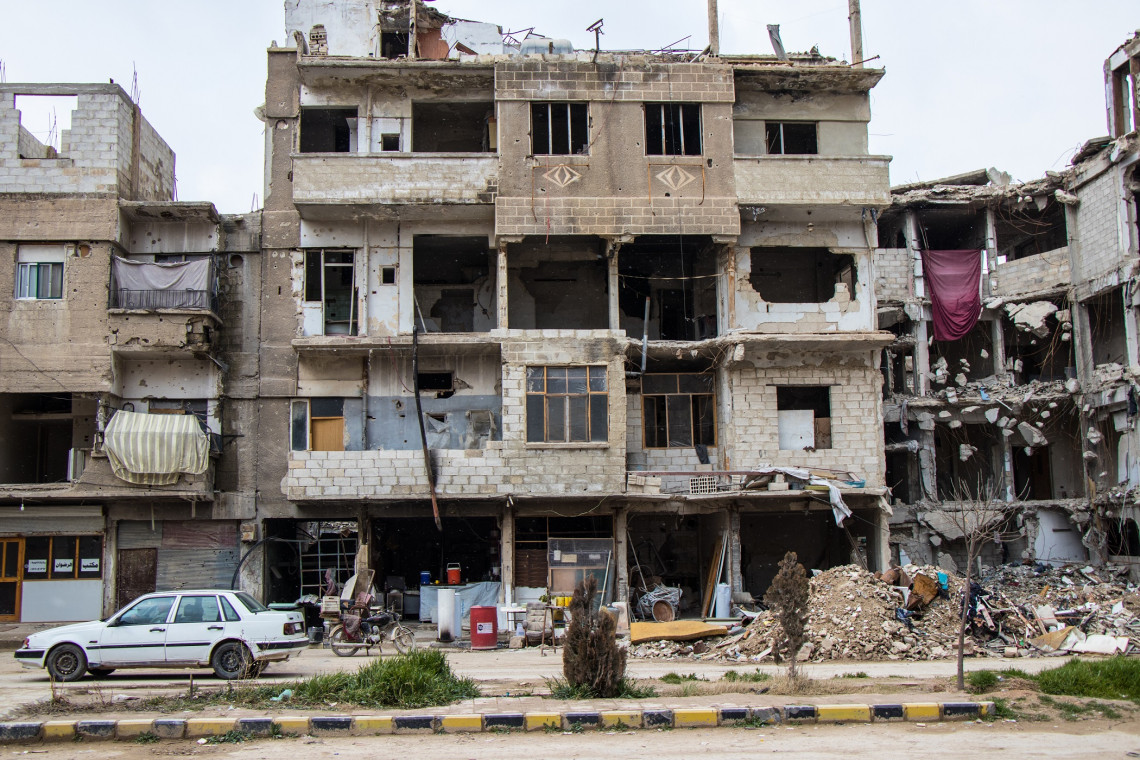
Operational update on Syria: Maintaining vital support to the most vulnerable in times of COVID-19, while bracing for increased needs
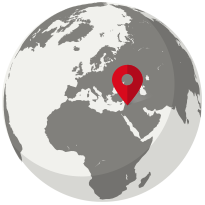
For more than 9 million Syrians who are food insecure, a steep increase in prices has resulted in a further push towards poverty and aid dependence. Countless families have been affected either by the loss of jobs or huge reductions in their sources of income.
Hostilities in the north-west earlier in the year have led to large numbers of casualties, massive displacement of population, and the damage of essential infrastructure including health centres. Millions of people are already displaced across the country living in camps, makeshift buildings, and partially destroyed homes. Recent hostilities in southern Idleb and in northern Hama led to renewed displacement.
For every person missing in Syria, there are countless people missing them. pic.twitter.com/1Nvqoy49sE
— ICRC (@ICRC) August 30, 2020
The north-east continues to host more than 100,000 displaced people who fled areas affected by hostilities, in addition to long-term refugees from Iraq and stranded foreign women and children. Living conditions in the camps where two-thirds of the population are children remain very difficult.
To adapt to the swiftly changing situation following the arrival of the COVID-19 pandemic, the ICRC reviewed its humanitarian response in cooperation with the Syrian Arab Red Crescent, to maintain and secure priority life-saving activities. This remains an ongoing exercise as the scope and effects of the pandemic evolve.
As with the movement restrictions that made it more difficult for humanitarian organizations to carry out their work, the ICRC will continue to negotiate the conditions to maintain its programmes, securing procurement channels, and maintaining its 700 strong in-country national and international workforce.
Our large-scale programmes in the fields of water and habitat, health, economic security, and humanitarian protection, continue to address conflict-related needs, and due to their focus on particularly vulnerable communities, also play a significant role in improving the sanitation, nutrition and health status of millions of people in Syria as they face the COVID-19 pandemic and the economic deterioration.
Further assistance is planned for previously supported beneficiaries who were helped to cultivate their lands or set up small businesses, so they can strengthen and shore up their projects. We are also assessing possibilities for additional assistance to other vulnerable populations such as daily wage workers, employees from the informal economy, and the self-employed.
The ICRC and the Syrian Arab Red Crescent continue to work across Syria to provide vital services responding to the most pressing needs, carrying out urgent repairs to critical water infrastructure, distributing food and daily hot meals to the most vulnerable people, and supporting healthcare services in communities and in camps.
Our operational update from January to June 2020.
COVID-19 pandemic mitigation
We have supported and worked with the Syrian Arab Red Crescent to mitigate the spread of COVID-19 among vulnerable populations through a three-month long distribution of hygiene kits to vulnerable, internally displaced communities. We have also provided chemicals, consumables, equipment for SARC’s Infection Prevention and Control as well as communication activities. The Field Hospital at the Al Hol camp continued to offer critical medical services to the camp population.
In addition, we have supported the capacity of health and humanitarian personnel and volunteers to respond by protecting against exposure to COVID-19 and continue to increase distribution of disinfectant and Personal Protective Equipment (PPE). We have also provided the same assistance for personnel of selected public health structures important for vulnerable populations.
ICRC has provided hygiene materials for 20,000 detainees by way of hygiene kits, and detention authorities with disinfectant for premises cleaning. In addition, PPE is being provided to prison and health staff, with technical assistance for use.
Food and livelihood assistance
As hundreds of thousands of people will require additional support in the coming months and possibly years, our main priority remains to assist people in maintaining livelihoods and sustain food security. Our food and assistance programmes have helped over 600,000 people since the start of 2020.
Over 260,000 vulnerable people including the elderly and people with disabilities benefitted from ICRC’s emergency food assistance while collective kitchens provided meals for over 70,000 people daily. To improve the living conditions of vulnerable families, ICRC provided essential household items to some 77,000 people on a monthly basis. As prices of hygiene items continued to increase, ICRC provided sanitation and hygiene products to over 200,000 displaced.
ICRC provided and rehabilitated equipment for bakeries located in affected areas to increase the capacity of their production lines benefiting around 330,000 people daily. We continue to support the purchasing power of vulnerable families struggling due to the economic situation, providing them with essential material to support their small businesses as well as farmers with seeds, fertilizers, and irrigation kits.
Health
With half of the health facilities in Syria out of service or partially functioning; those running are struggling to cope with limited staff, medicine, and supplies. Displaced people in temporary accommodation or camps are particularly vulnerable to health complications. Our focus on access to health care for most vulnerable in conflict-affected areas has continued.
650,000 Syrians benefited from the support ICRC provided to public hospitals, including the rehabilitation of hospital facilities, emergency repairs as well as the provision of equipment and medicine. In the ICRC supported Diabetes and Leishmaniasis centres more than 127,000 consultations were carried out.
More than 570,000 patients have been treated at 27 ICRC supported mobile health units and polyclinic and some 11,300 patients were transported throughout Syria in the ICRC supporting ambulance service of the Syria Arab Red Crescent.
The ICRC/SARC field hospital in Al Hol camp in Al Hassekeh provided medical and surgical services to a population of over 60,000 people, conducting over 6,000 consultations. Physical rehabilitation centres in Aleppo and Damascus provided patients with prosthetic and orthotic devices, in addition to physiotherapy services, walking aids and prosthesis or orthosis repair
Water and habitat
Across the country, Syrians continued to struggle due to water shortages with many water treatment plants, stations, and networks out of service or damaged. The ICRC, together with the Syrian Arab Red Crescent, focused on enhancing access to clean water for over 10 million Syrians on a daily basis by supporting waterboards, rehabilitating water stations, sewage treatment plants, pumping stations, boreholes, and pipelines.
This includes a large water disinfection programme, to ensure that affected people in various parts of the country have sustainable access to safe drinking water. The ICRC also delivered drinking water through water trucking to distribution points and essential facilities. In coordination with the Ministry of Electricity, ICRC is providing electrical supply in, particularly vulnerable locations.

